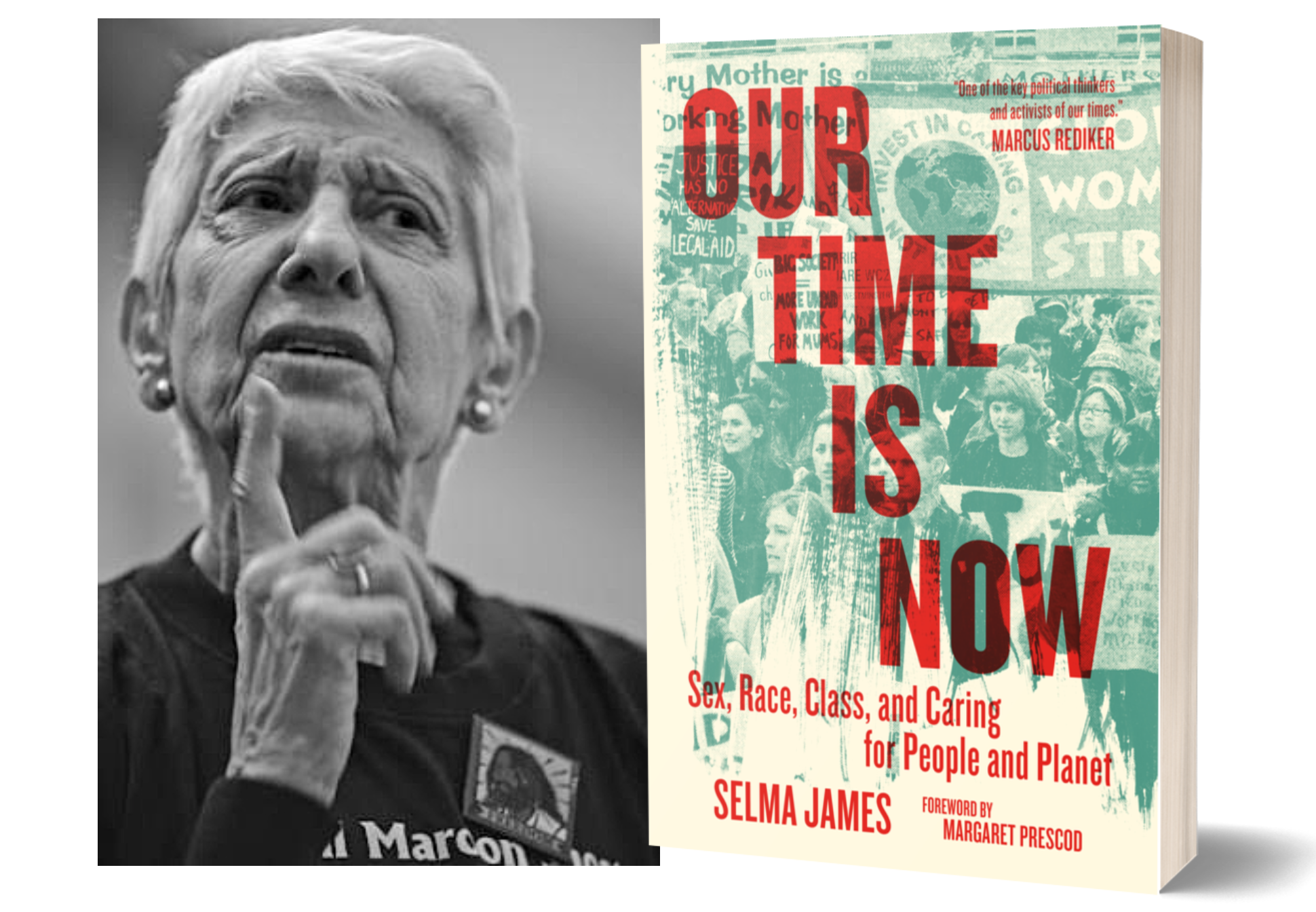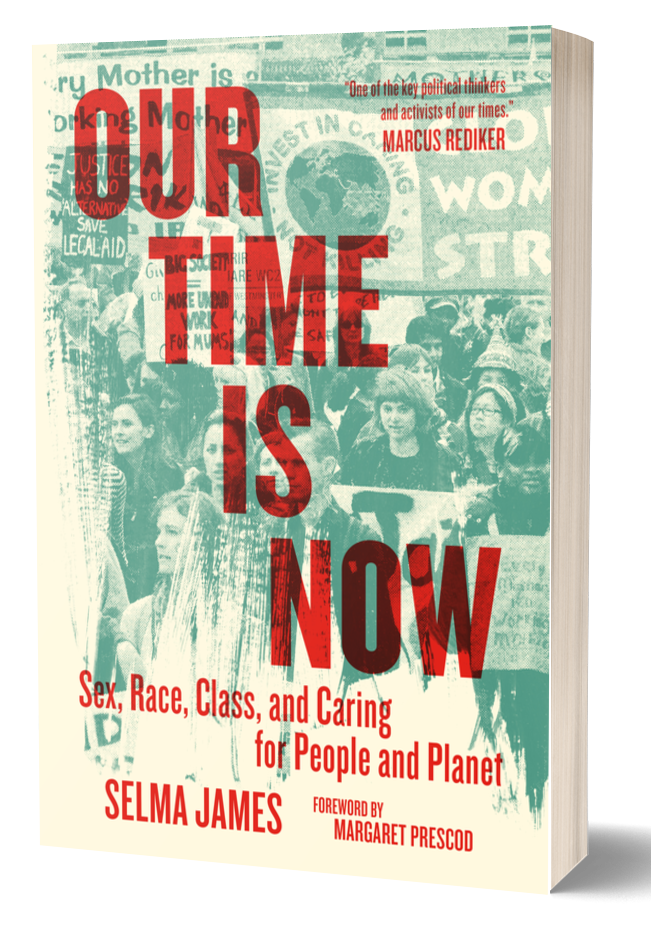Born 1930, Brooklyn, New York.
Selma James (nee Deitch) is a women’s rights and anti-racist campaigner and author who coined the word ‘unwaged’ to highlight the unpaid care work disproportionately done by women.
‘We have a slogan in London: ‘Mothers, daughters, sisters, wives, fighting for our loved ones’ lives.’ And that’s not a romantic view of women’s work … That is the reality. That’s who does it. That’s who’s on the line in front of the prison where men and women are held unjustly. It’s women who are doing this work. And it’s an extension of the caring work that we have always done.’
Selma James*
Born into a working-class Jewish family during the Depression, Selma grew up on the corner of Ralph Avenue and Dean Street in Brooklyn, New York, where the Jewish ghetto and the Black ghetto met. Her father was a truck driver and trade unionist, and her mother was a factory worker and later housewife who became involved in the local struggle for justice for mothers on welfare.
At the age of 15, Selma joined the Johnson-Forest Tendency, a minority group within Trotskyism founded and led by the Trinidad socialist historian and activist, CLR James. He was 44 when they met. Selma began attending Johnson- Forest meetings and a CLR class on slavery and the civil war. In 1947, Selma had married a fellow factory worker, and by the age of 18 she had given birth to their only child, Sam, a son. The marriage didn’t last, and four years later, the couple had divorced. By then Johnson-Forest had left Trotskyism and was independent of all political parties.
After hearing Selma’s ideas on the “woman question”, CLR encouraged her to write. In 1952, Selma wrote her first pamphlet named A Woman’s Place, the first publication of the newly independent Johnson-Forest. This was followed by a biweekly column of the same name in the Johnson-Forest newspaper, Correspondence. By this time, McCarthyism was reaching its peak, and Selma and CLR were blacklisted as “subversives”. Selma lost her job, and CLR was detained on Ellis Island. He travelled to England before he could be deported, and in 1955, Selma followed him with Sam. The couple married in 1956 and remained together until 1980, living and working as close political collaborators. In 1958, they travelled to live in the West Indies after CLR was invited by Trinidad’s Chief Minister Eric Williams to assist with the movement for independence and federation of the English-speaking Caribbean. Selma worked for the movement’s newspaper, The Nation, editing the letters page, and was CLR’s secretary.
Independence was won but the federation was voted down, and the Jameses returned to London in 1962. Selma brought with her valuable experience of the anti-imperialist movement and became the first organizing secretary of the Campaign Against Racial Discrimination. As the women’s liberation movement was becoming active she brought antiracism to it, but most of the women were white and middle class and not all welcomed her antiracist working-class perspective. In 1972, she wrote another pamphlet, Women, the Unions and Work, Or…What is Not to Be Done, which included the key demand “wages for housework”. The demand transformed into the International Wages for Housework Campaign against women’s and children’s poverty and dependence, though Selma’s position was rejected by the Women’s Liberation Movement, which instead focused on women rising in the professions, government and industry.
In 1975, Selma became the first spokeswoman for the English Collective of Prostitutes, an autonomous organization within the WFH Campaign, and co- founded the Women’s Centre near Euston Station. Initially a squat, it became the Crossroads Women’s Centre in Kentish Town. From the outset, the Centre has been multiracial, providing a base for grassroots groups campaigning for the rights of women of colour, sex workers, LGBTQ+, immigrants, asylum seekers, rape and domestic violence survivors, domestic workers, women with disabilities, single mothers and working-class women generally as mutually supportive of each other, and for men who share their perspective. Bangladeshi mothers were among the first to come for help with housing and against state violence after they were injected with DepoProvera, the harmful long-term contraception. In 1976, Selma made a film, All Work and No Pay, about the Wages for Housework Campaign for the BBC Open Door programme, much of which was filmed at the Centre,
Crossroads continues to operate as the longest standing women’s centre in London. Faced with eviction, the Centre relocated to a rented property on Kentish Town Road in 1997 with the help of a sympathetic landlord, before raising sufficient funds to purchase their current premises at Wolsey Mews, Kentish Town (2010).
Selma has continued her tireless engagement in struggles for social justice, remaining active in Crossroads and helping to launch the Global Women’s Strike (GWS) in 2000. She is a founding member of the International Jewish Anti- Zionist Network (2008). As co-ordinator of GWS, Selma has become increasingly involved in the environmental movement. In 2020 GWS launched the call for a Care Income Now!, jointly with the Green New Deal for Europe. The care income builds on the success of previous campaigning, including during the UN Decade for Women and follow up conferences in the 80s and 90s, when the WFH Campaign mobilized its network in the Global South and the Global North to press governments to agree that unwaged work in the home, on the land and in the community should be included in every country’s GDP. At the same time, Black Women for Wages for Housework (which now coordinates Women of Colour in GWS) was holding workshops on environmental racism.
Selma’s many writings, including Sex, Race and Class (1974), and Marx and Feminism (1983), a reading of Marx from the perspective of unwaged women, have found resonance with a new generation of feminists. In 2012, her first anthology was published as Sex, Race, and Class – The Perspective of Winning: A Selection of Writings, 1952-2011. This was followed in 2021 by Our Time is Now: Sex, Race, Class, and Caring for People and Planet, including her more recent writings edited by her fellow campaigner and long-term partner, Nina Lopez. Her concluding piece, “The Organizational Strategy of Autonomy”, spells out how WFH and the GWS, working across national boundaries, cities and countryside, have been able to bring together different sectors so they are a power for each other against the competition, personal ambition and corruption that have so often defeated movements for social change.
Selma’s campaigning work was recognised with a Long-Term Achievement Award from the Sheila McKechnie Foundation in 2021.
WFH celebrates 50 years of campaigning this year with a series of events showcasing its international network and its 1972-2022 archives.
Sources
Dixon, G. “‘Find People That Challenge You’: Life Lessons To Be Learned From A 91-Year-Old Activist”, Refinery29 , 23rd August 2021. Accessed 19 February 2022. https://www.refinery29.com/en-gb/selma-james-activist-life-lessons
Gardiner, B. ‘A life in writing: Selma James’, The Guardian , 8th June 2012. Accessed 19 February 2022. https://www.theguardian.com/books/2012/jun/08/life-in-writing-selma-james
Goodman, A. ‘VIDEO: “Sex, Race and Class” – Extended Interview with Selma James on her Six Decades of Activism’, Democracy Now , 18th April 2012. Accessed 19 February 2022. https://www.democracynow.org/2012/4/18/video_sex_race_and_class_extended_interview_with_selma_james_on_her_six_decades_of_activism *The quote above is from this source.
Hawkins, L. ’60 Years of Intersectional Feminism: An Interview with Selma James’, Yes Magazine , 13th January 2022. Accessed 19 February 2022. https://www.yesmagazine.org/social-justice/2022/01/13/intersectional- feminism-interview-selma-james
‘Long-term Achievement Award: Selma James’, Sheila McKechnie Foundation, 2021. Accessed 19 February 2022. https://smk.org.uk/awards_nominations/selmajames/
‘Our Centre began as a squat over 40 years ago…’, Crossroads Women , 2019. Accessed 19 February 2022. http://crossroadswomen.net/wp- content/uploads/2019/06/crossroads-timeline-200619b.pdf
‘People for Tomorrow – Selma James: Our Time is Coming’ [broadcast], BBC Archive, originally broadcast 21st January 1971, duration: 29:53. Accessed 19 February 2022. https://www.bbc.co.uk/archive/people-for-tomorrow–selma- james-our-time-is-coming/zhd3xyc
Valle, C. interview with Selma James, ‘Real Theory Is in What You Do and How You Do It’, Verso Books , 11th January 2021. Accessed 19 February 2022. https://www.versobooks.com/blogs/4962-real-theory-is-in-what-you-do-and-how- you-do-it
Sources
Wages for Housework: 50 Years of Campaigning https://globalwomenstrike.net/50years/
Global Women’s Strike YouTube channel https://www.youtube.com/channel/UC2Jr4LBmi_HxXvCc0gimuRQ
Sex, Race and Class – The Perspective of Winning: A Selection of Writings, 1952-2011.
https://crossroadsbooksonline.net/collections/selma-james/products/sex-race- and-class-the-perspective-of-winning
Our Time is Now: Sex, Race, Class, and Caring for People and Planet https://crossroadsbooksonline.net/collections/frontpage/products/our-time-is- now
James, S., Introduction to Ujamaa: The Hidden Story of Tanzania ‘s Socialist Villages, Ibbott, R.
https://crossroadsbooksonline.net/collections/selma-james/products/ujamaa- the-hidden-story-of-tanzania-s-socialist-villages
James, S., Introduction to Jailhouse Lawyers: Prisoners Defending Prisoners v the USA , Abu-Jamal, M. https://crossroadsbooksonline.net/collections/selma- james/products/jailhouse-lawyers-prisoners-defending-prisoners-v-the-usa








